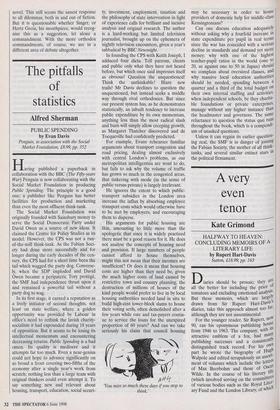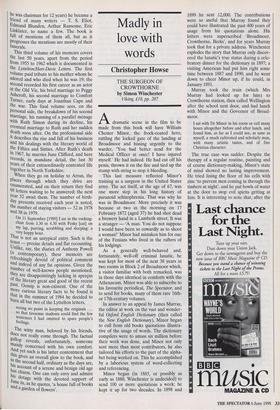A very even tenor
Kate Grimand
HALFWAY TO HEAVEN: CONCLUDING MEMOIRS OF A LITERARY LIFE by Rupert Hart-Davis Sutton, .£18.99, pp. 163 Diaries should be prosaic; they are, all the better for including the price 0. ' tomatoes and excluding emotional analysts. But these memoirs, which are largelY drawn from Sir Rupert Hart-Davis's diaries, take this approach almost too far, although they are not unsentimental. For the younger reader, Sir Rupert, u°111 90, ran his eponymous publishing houSe from 1946 to 1963. The company, with Its attractive emblem of a fox, had mall publishing successes and a consistently distinguished track record. For his awil part he wrote the biography of Hugh Walpole and edited scrupulously an assort' ment of volumes which include the letters of Max Beerbohm and those of Oscar Wilde. In the course of his literary life (which involved serving on the committees of various bodies such as the Royal Liter- ary Fund and the London Library, of 'which he was chairman for 12 years) he became a friend of many writers — T. S. Eliot, Edmund Blunden, Arthur Ransome, Eric Linldater, to name a few. The book is fall of mentions of them all, but as it progresses the mentions are mostly of their funerals.
This third volume of his memoirs covers the last 50 years, apart from the period from 1955 to 1962 which is documented in the LytteltonIllart-Davis Letters. The first volume paid tribute to his mother whom he adored and who died when he was 19; the second recorded his first career as an actor at the Old Vic, his brief marriage to Peggy Ashcroft, his second marriage to Comfort Turner, early days at Jonathan Cape and the war. This final volume sees, on the Personal side, the breakdown of his second marriage, his running of a parallel ménage With Ruth Simon during its decline, his eventual marriage to Ruth and her sudden death soon after. On the professional side it describes the rise and fall of his business and his dealings with the literary world of the Fifties and Sixties. After Ruth's death in 1967, he marries June Clifford, and here records, in mundane detail, the last 30 Years of their extraordinarily contented life together in North Yorkshire.
When they go on holiday to Arran, the Places through which they drive are enumerated, and on their return they find 68 letters waiting to be answered; the next Year 52 await them. The number of birth- day presents received each year is noted, the number of staying visitors — 52 in 1978 and 38 in 1979.
CM 11 September [1989] I sat in the rocking- chair from 3.30 to 4.30 with Pesky [cat] on my lap, purring, scrabbling and sleeping: a very happy hour.
That is not an untypical entry. Such is the tenor — precise details and flat recounting. Unlike, say, the diaries of Anthony Powell ka contemporary), these memoirs are refreshingly devoid of political comment and indeed of any fat opinions. Given the number of well-known people mentioned, they are disappointingly lacking in apercus of the literary great and good of the recent Past. Gossip is non-existent. One of the more curious literary facts to be found is that in the summer of 1984 he decided to burn all but two of the Lyttelton letters,
seeing no point in keeping the originals . SO that tiresome students could find the few sentences I had omitted to spare people's feelings.
The witty man, beloved by his friends, does not really come through. The factual galloP reveals, unfortunately, someone nlainly concerned with his own comfort. And yet such is his latter contentment that this gives an overall glow to the book, and in the second half, ordinary as the days are, !us account of a serene and benign old age !las charm. One can only envy and admire .1111s dotage with the devoted support of tine in, as he quotes, 'a house full of books and a garden of flowers'.



























































 Previous page
Previous page